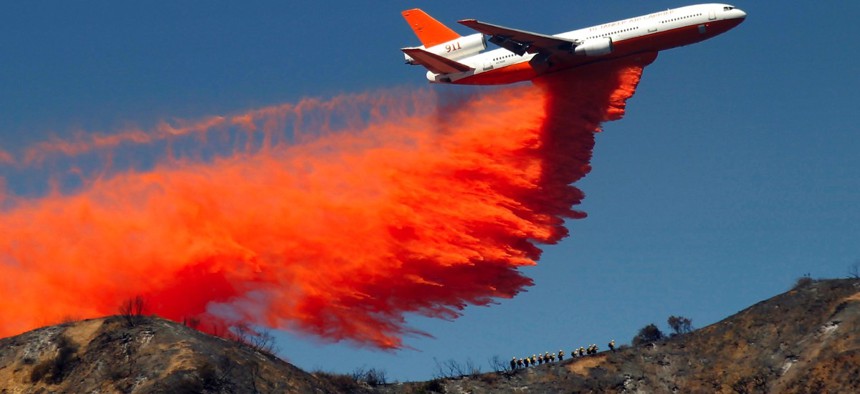Why California’s Wet Winter May Make the Wildfire Danger Worse

A DC-10 airplane tanker drops fire retardant to battle a wildfire in the San Gabriel Mountains in Azusa, Calif. Nick Ut / AP Photo
Also in our State and Local Daily Digest: Georgia cuts 7,251 people from food stamps; Iowa’s new governor; and N.D. Republicans decry Trump’s rural cuts.
WILDFIRES | Despite the wet winter across California, that doesn’t mean that wildfire risk is reduced. In some cases, it might be even worse. In addition to all the vegetation that died after six years of drought—90 percent of brush in San Diego County is dead—there’s now a lot of tall grass that’s beginning to dry out following the rainy winter. “This year’s rain has made our fire conditions far worse than they were last year,” according to San Diego County Fire Authority Chief Tony Mecham. [The San Diego Union-Tribune]
NEW GOVERNORS | Iowa’s lieutenant governor, Kim Reynolds, is now officially the Hawkeye State’s new governor following Terry Branstad resigning to become the new U.S. ambassador to China. [KCCI-TV]
FOOD STAMPS | Following new work mandates to remain eligible for food stamps in Georgia, 7,251 people were dropped in April. In January, the state informed 11,779 people that they had three months to find a new job or lose access to food stamps. [Atlanta Journal Constitution]
WATERWAYS | The Trump administration hopes to shift the $427 million burden of cleaning up regional waterways like the Great Lakes onto states and localities. Program advocates argue cuts to the Environmental Protection Agency’s budget threaten pollution initiatives and thus human lives, fish and tourism. "The great threat is that you lose faith among state agencies and local communities that the federal government will do their share," said Brian Moore, the National Audubon Society's policy director for the Gulf of Mexico. [NBC 26]
AGRICULTURE | While North Dakota Republicans are calling President Trump’s budget proposal a good start, they’re none too pleased with billions of dollars in cuts to agriculture over the next decade. “Cuts to programs like crop insurance, conservation reserve programs and agriculture research are unacceptable, especially when our farmers and ranchers face challenges due to low commodity prices,” said U.S. Sen. John Hoeven. “We need to prioritize funding programs important to our producers and rural communities, because they are already doing their part to help reduce the debt and deficit.” [The Bismarck Tribune]
MONUMENTS | Charlottesville, Virginia may have removed its statue of Confederate Gen. Robert E. Lee, but Democratic Mayor Michael Signer, who condemned recent white nationalist protests in his city, argues erasing history isn’t the right approach. [The Washington Post]
OVERDOSES | The opioid epidemic in the Philadelphia region has put some of the city’s librarians in a difficult position. In one library in particular, the McPherson Square branch in the Kensington neighborhood, overdoses have become so common in the facility’s bathrooms and in the park next door that the librarians have taken it upon themselves to get trained in the administration of Narcan. Now the library plans on installing needle disposal boxes in the park, and will staff a full-time addiction outreach worker. [Philly.com]





